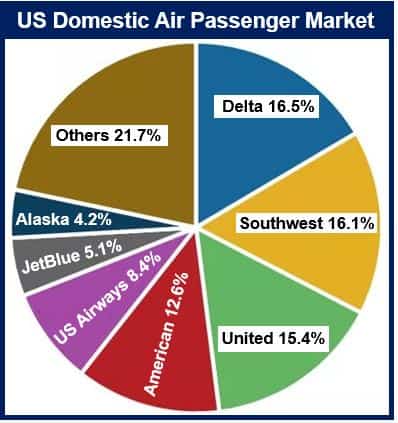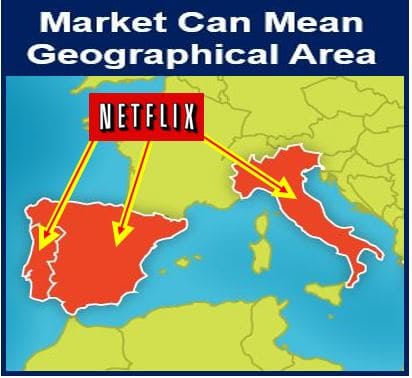A Market is any place where makers, distributors, or retailers sell, and consumers buy. Examples include shops, high streets, and websites. The term may also refer to the whole group of buyers for a good or service.
Businesses that operate in markets are usually in competition with other companies. The other companies or rivals offer similar goods or services.
When the press writes about markets plummeting or going through the roof, they are usually referring to the price of shares (stocks), commodities, or other derivatives. For example, the headline “US markets suffer biggest one-day loss in almost four years,” refers to Wall Street (Dow Jones Index), the S&P 500, and Nasdaq.
US Market
The United States is the world’s largest marketplace for most products and services. However, China is starting to take the number one spot in several sectors.

The term emerged in the British Isles in the early 1200s, and meant ‘a meeting at a fixed time for buying and selling livestock and provisions.’ It came from Old French ‘marchiet’, which meant ‘trade, commerce, marketplace.’ In most of Western Europe, the word can be traced back to the Latin ‘mercatus’, which meant ‘trading, marketplace, buying and selling.’
We often use the word ‘marketplace’ with the same meaning as ‘market.’ However, often ‘marketplace’ has a different meaning.
The Cambridge Dictionaries Online have the following definition of the term:
“The people who might want to buy something, or a part of the world where something is sold,” or “The business or trade in a particular product, including financial products.”
NetMBA says that the term market (in marketing) refers to a group of consumers or organizations that is interested in purchasing a product or service, has the resources to buy it, and is allowed to by law and other regulations to acquire it.
Markets are always changing – they are dynamic. Successful businesses are the ones that closely monitor trends and evolving consumer requirements, which are influenced by several factors, including changing economic conditions, lifestyles, new technologies, discoveries, or new fashions.
The prices of goods and services are established by the market. They facilitate trade and enable the distribution and allocation of resources within an economy. They allow any item or service that can be bought or sold to be evaluated and priced.
Markets either emerge naturally, spontaneously, or we build them deliberately.
The word may also refer to all the players within a sector. For example, the financial market means commercial banks, retail banks, pension funds, insurance companies – any environment where buyers and sellers trade in derivatives, bonds, equities and currencies.

Markets can be physical places
The term may refer to a physical place built to trade in specific goods, such as fish markets, farmers’ markets, street markets, food retail markets, and wet markets (sell meat and groceries).
Flea markets, for example, exist outdoors with stalls that sell second hand items, antiques, refurbished items, etc.
Any retail outlet, ranging from a tiny corner shop to a giant store is a type of market. Shopping malls, bazaars, souks, flea markets, and discount stores are markets.
Companies must define their market
One of the fundamental keys to business success is to first define your market – something many companies fail to do.
Experts say that a surprising number of businesses put together a marketing plan hastily. In other words, they do so without first defining exactly what their market is.
It is a bit like the person who is putting together a jig-saw puzzle in a hurry. Perhaps they do not first checking the picture on the back of the box. They may think they are assembling the pieces of the Eiffel Tower, but it is the Empire State Building.
Before deciding how you are going to get to those potential customers, you must be able to first define that market.

The economies of the US, Canada, Western Europe, Australasia and Japan are known as ‘open markets’. They contrast with the closed markets of Cuba and North Korea.
Quotes using the word ‘market’
Co-founder of Microsoft, multi-billionaire business magnate Bill Gates, said:
“If African farmers can use improved seeds and better practices to grow more crops and get them to market, then millions of families can earn themselves a better living and a better life.”
John F. Kennedy (1917-1963), the 35th President of the United States, said:
“A nation that is afraid to let its people judge the truth and falsehood in an open market is a nation that is afraid of its people.”
Billionaire business magnate, Warren Buffett, considered by many as the most successful investor of the twentieth century, said:
“Only buy something that you’d be perfectly happy to hold if the market shut down for 10 years.”
Market failure
This occurs when the market does not function as efficiently as it should. This could be because of:
- Externatilities, e.g. a factory contaminates the drinking water of nearby residents.
- The abuse of market power, e.g. monopolistic behaviors.
- A situation in which one person in a business deal has more information than the other person. We call this ‘asymmetric information.’
- When public goods, such as roads, railroads, national defense have to be provided by the state.
Derivatives of the word “market”
There are many derivatives of the word market. Let’s have a look at them, their meanings, and how we can use them in a sentence:
-
Market (noun)
A place or arena where goods and services are exchanged.
Example: “The local farmers’ market offers the freshest produce every weekend.”
-
Market (verb)
To advertise or promote something.
Example: “The company decided to market its new product through social media channels.”
-
Marketable (adjective)
Suitable for buying and selling; in demand.
Example: “Her skills in web design are highly marketable in today’s tech-driven economy.”
-
Marketer (noun)
A person who is involved in the promotion or selling of products or services.
Example: “As a digital marketer, he excels in creating campaigns that engage online audiences.”
-
Marketability (noun)
The state or quality of being in demand by buyers.
Example: “The marketability of the product increased after the celebrity endorsement.”
-
Marketing (noun)
The action or business of promoting and selling products or services.
Example: “Marketing is a key component of any business strategy to increase brand awareness.”
-
Marketing (verb)
Present participle form of ‘to market’.
Example: “She is marketing her artisanal soaps through various online platforms.”
-
Marketed (verb)
Past tense form of ‘to market’.
Example: “They successfully marketed the new software to a wide audience.”
-
Market-driven (adjective)
Determined or influenced by market forces or demands.
Example: “The company’s market-driven strategies have made it a leader in the industry.”
-
Market-leading (adjective)
Being the best or most advanced in a particular market.
Example: “Their market-leading innovation has set them apart from the competition.”
-
Marketeer (noun)
Another term for a marketer, often used in British English.
Example: “The marketeers at the firm devised a brilliant advertising campaign.”
-
Marketplace (noun)
Another term for a market; a space where commercial dealings are conducted.
Example: “Online marketplaces have become increasingly popular for the convenience they offer.”
-
Nonmarket (adjective)
Not related to or operating within the market system.
Example: “Nonmarket factors such as government policies can also influence business environments.”
-
Submarket (noun)
A segment of a larger market.
Example: “Their product dominates the submarket of environmentally-friendly cleaning supplies.”
Video – Market definition
This video, from our YouTube partner channel – Marketing Business Network – explains what a ‘Market’ is using simple and easy-to-understand language and examples.
